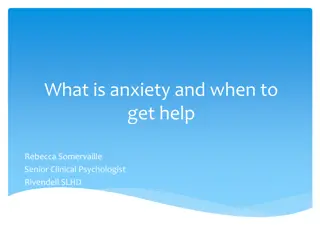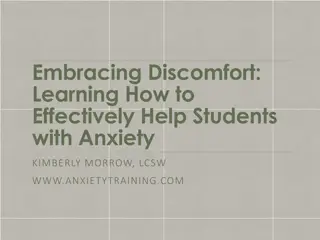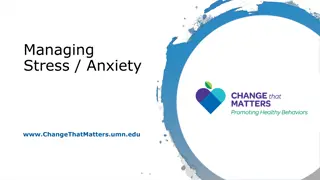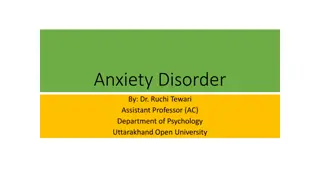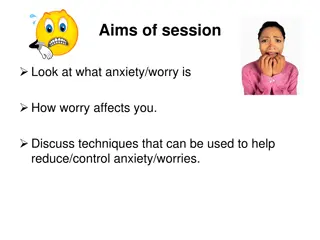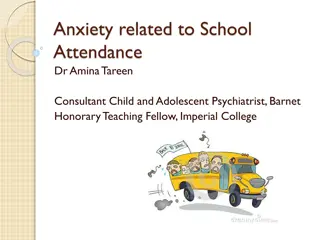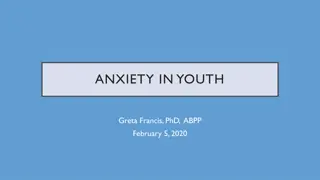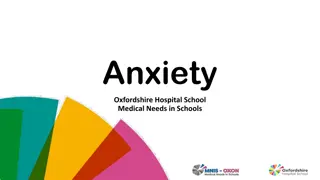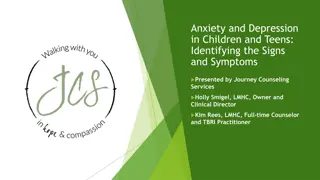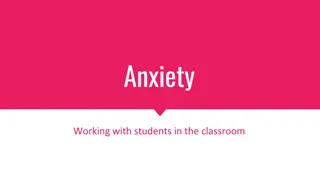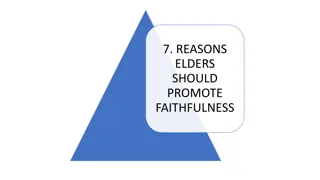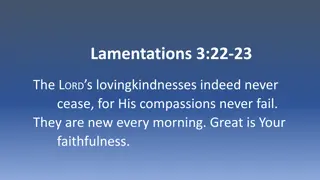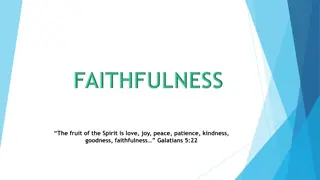Mental Health & Faithfulness in an Age of Anxiety by Rob Merchant
Explore the intersection of mental health and faithfulness in an age of anxiety through insightful reflections and quotes. Delve into the impact of trauma on the brain, the importance of honesty in storytelling, and the grace of acceptance. Discover how individuals navigate challenges with God's grace and find freedom in being true to themselves.
Download Presentation

Please find below an Image/Link to download the presentation.
The content on the website is provided AS IS for your information and personal use only. It may not be sold, licensed, or shared on other websites without obtaining consent from the author. Download presentation by click this link. If you encounter any issues during the download, it is possible that the publisher has removed the file from their server.
E N D
Presentation Transcript
Mental Health & Faithfulness in an Age of Anxiety Rob Merchant @robmerchant stmellitus.ac.uk | @stmellitus
Break out rooms Break out rooms Groups of 3-4 5 minutes Who are you / where are you as you journey down the mountain? This is a quick snap-shot moment & using story & image means we don t need to get too personal to quickly.
Honesty... we all carry our own story Honesty... we all carry our own story "It is God's grace that is first... we do not change in order to experience grace. God meets us where we are and in his peace our pain can surface and he meets us in our woundedness. Because of God's grace we do not have to conform and perform for acceptance. These aspects of... teaching had a profound effect on me. The pain of wounds surfaced more strongly and I gained a freedom to be who I am without having to perform ana pretend. I am not ashamed of being me any more. The process was long, slow and very painful at times. Of course, it is not complete." A correspondent quoted in Stephen Pattison, Shame: Theory, Therapy, Theology, 2000, Cambridge University Press, p274
Approximately 1 in 4 people in the UK will experience a mental health problem each year. In England, 1 in 6 people report experiencing a common mental health problem (such as anxiety and depression) in any given week.
"We now know that trauma compromises the brain area that communicates the physical, embodied feeling of being alive. These changes explain why traumatised individuals become hypervigilant to threat at the expense of spontaneously engaging in their day-to-day lives. They also help us understand why traumatised people so often keep repeating the same problems and have such trouble learning from experience. We now know that their behaviours are not the result of moral failings or signs of lack of willpower or bad character - they are caused by actual changes in the brain." Bessel Van Der Kolk, 2014, The Body Keeps the Score: Mind Brain and Body in the Transformation of Trauma, p3
Break out rooms Break out rooms Groups of 3-4 5 minutes What s not been okay? This is a moment to take a deeper step, you don t need to share lots of detail, but give one another the gift of being heard.
Top tips Top tips Know the signs to spot Well being check up Stress bucket Online tools Mindfulness 5,4,3,2,1 Breathing
Mental health triggers can include: Mental health triggers can include: Personal life changes e.g. Bereavement Relationship breakdown Having children Health scares or physical illness Changes at work e.g. Starting a new job Coping with an increased workload or promotion Poor relationships with colleagues or managers Redundancy, or fear of redundancy
Signs to spot Signs to spot Physical can include: Frequent headaches or upset stomachs Suffering from frequent minor illnesses Difficulty sleeping or constant tiredness Being run down Lack of care over appearance Sudden weight loss or gain
Signs to spot Signs to spot Emotional & behavioural; Irritability, aggression or tearfulness Being withdrawn not participating in conversations or social activities Increased arguments with others Increased consumption of caffeine, alcohol, cigarettes or sedatives Indecision, inability to concentrate Erratic or socially unacceptable behaviour Being louder or more exuberant than usual Loss of confidence Difficulty remembering things Loss of humour.
The stress bucket
https://www.nhs.uk/conditions/stress-anxietv-depression/mood-self- assessment/ https://www.moodscope.com https://www.nhs.uk/apps-librarv/categorv/mental-health https://www.mind.org.uk https://www.time-to-change.org.uk https://www.mentalhealth.org.uk
Mindfulness Mindfulness ....mindfulness can be described as being fully aware of your own experience in the present moment in a non-judgmental way. There are four vital strands to this definition: awareness, experience, the present moment, and non-judgment.... ...many will... argue that something very similar to mindfulness has been around in the Christian tradition...We haven t called it mindfulness. We ve called it silent prayer or contemplative prayer , thedesert tradition , or mystical theology .... Tim Stead, Mindfulness & Christian Spirituality: Making space for God, SPCK, p6, p18
5 5- -4 4- -3 3- -2 2- -1 Coping Technique for Anxiety 1 Coping Technique for Anxiety 5: Acknowledge FIVE things you see around you. It could be a pen, a spot on the ceiling, anything in your surroundings. 4: Acknowledge FOUR things you can touch around you. ... 3: Acknowledge THREE things you hear. ... 2: Acknowledge TWO things you can smell. ... 1: Acknowledge ONE thing you can taste.
Breathing Breathing Lots of good recommendations, to try is on: https://www.nhs.uk/conditions/stress-anxiety-depression/ways- relieve-stress/ 4-7-8 breathing (4 inhale, 7 hold, 8 exhale) 7 then the Lord God formed man from the dust of the ground, and breathed into his nostrils the breath of life; and the man became a living being. (Genesis 2.7, NRSV)
Break out rooms Break out rooms Groups of 3-4 5 minutes Sharing our own top tips; what has sustained you? This is an opportunity to encourage by noticing what we have found helpful and to wonder what we might try.
Hope & the eschatological disciple... Hope & the eschatological disciple... 5 Therefore, since we are justified by faith, we have peace with God through our Lord Jesus Christ,2through whom we have obtained access to this grace in which we stand; and we boast in our hope of sharing the glory of God.3 And not only that, but we also boast in our sufferings, knowing that suffering produces endurance,4and endurance produces character, and character produces hope,5 and hope does not disappoint us, because God's love has been poured into our hearts through the Holy Spirit that has been given to us. (Romans 5.1-5, NRSV)
Caravaggio: Pilgrim s Madonna, 1604





